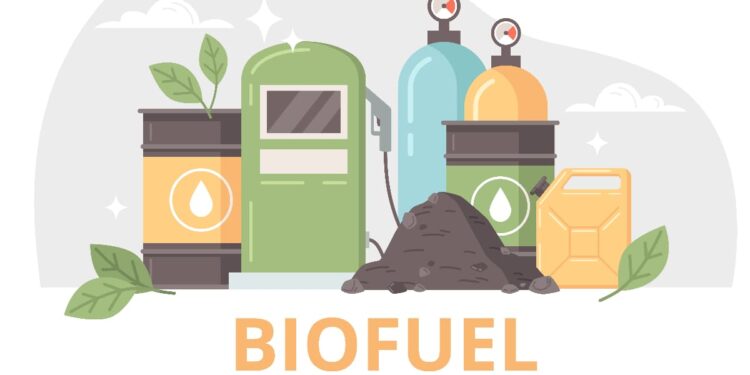Contents
- 1 Introduction
- 2 What are Fourth-Generation Biofuels?
- 3 Production of Fourth-Generation Biofuels
- 4 Sources of Fourth-Generation Biofuels
- 5 Advantages of Fourth-Generation Biofuels
- 6 Disadvantages of Fourth-Generation Biofuels
- 7 Position Among Biofuel Generations
- 8 Is Ethanol a Fourth-Generation Biofuel?
- 9 Types of Fourth-Generation Biofuels
- 10 Applications of Fourth-Generation Biofuels
- 11 Challenges and Future Prospects
- 12 Looking Ahead
- 13 Conclusion
Introduction
In the ever-evolving landscape of renewable energy, Fourth-Generation Biofuels stand as a testament to human ingenuity and our commitment to sustainable solutions. With an increasing emphasis on reducing carbon emissions and finding alternatives to traditional fossil fuels, Fourth-Generation Biofuels have emerged as a promising avenue for meeting our energy needs while minimizing environmental impact.
What are Fourth-Generation Biofuels?
Fourth-Generation Biofuels represent the latest advancements in the field of biofuel technology. Unlike their predecessors, these biofuels are derived from non-food sources such as algae, microorganisms, and waste biomass. This distinction makes them a game-changer in the quest for sustainable energy, as they sidestep the ethical and practical concerns associated with using food crops for fuel production.
Production of Fourth-Generation Biofuels
The production of Fourth-Generation Biofuels involves harnessing the natural capabilities of microorganisms and algae to convert organic matter into energy-rich compounds. Through processes like fermentation, thermochemical conversion, and anaerobic digestion, these microorganisms break down feedstocks to produce bio-oils, biogas, and other valuable byproducts.
Sources of Fourth-Generation Biofuels
The sources for Fourth-Generation Biofuels are remarkably diverse. Microalgae, for instance, possess a high lipid content that can be transformed into biodiesel through extraction and processing. Additionally, lignocellulosic materials like agricultural residues and forestry waste can be converted into biofuels through advanced technologies such as enzymatic hydrolysis and gasification.
Advantages of Fourth-Generation Biofuels
- Reduced Carbon Footprint: Fourth-generation biofuels emit significantly lower levels of greenhouse gases compared to conventional fossil fuels, aiding in the battle against climate change.
- Non-Food Source: By utilizing non-food feedstocks, these biofuels avoid the ethical concerns associated with diverting crops from food production.
- High Energy Yield: The energy yield per unit of feedstock is impressive, making Fourth-Generation Biofuels a viable and efficient energy source.
- Waste Utilization: These biofuels can be produced from various waste streams, offering a sustainable solution for managing organic waste.
- Economic Growth: The development and implementation of Fourth-Generation Biofuel technologies can foster innovation and create new economic opportunities.
Disadvantages of Fourth-Generation Biofuels
- High Initial Costs: The infrastructure required for large-scale production of Fourth-Generation Biofuels can demand substantial upfront investments.
- Technical Challenges: The processes involved in converting complex feedstocks can be technically demanding and require continuous refinement.
- Land and Water Requirements: Cultivating microorganisms or algae may necessitate significant land and water resources, potentially competing with other land uses.
- Competition for Resources: The cultivation of feedstocks for biofuels could potentially compete with agriculture for valuable resources like arable land and water.
- Limited Commercialization: While research is ongoing, Fourth-Generation Biofuels are not yet widely commercially available, hindering their immediate impact.
Position Among Biofuel Generations
Fourth Generation Biofuels represent a significant leap forward compared to their predecessors. First-generation biofuels were primarily based on edible crops like corn and sugarcane, while second-generation biofuels utilized non-edible biomass. Third-generation biofuels incorporated algae and other microorganisms, paving the way for the current generation’s advanced techniques and non-food feedstocks.
Is Ethanol a Fourth-Generation Biofuel?
Ethanol, while a biofuel, is not classified as a Fourth Generation Biofuel. It falls under the second generation as it is produced from non-food sources such as cellulose-rich materials like agricultural residues and wood.
Types of Fourth-Generation Biofuels
Fourth Generation Biofuels encompass a range of fuels, including:
- Bio-Oils: These are produced through the pyrolysis of feedstocks, resulting in liquid bio-oils that can be refined and used as fuel.
- Biogas: Produced from anaerobic digestion of organic matter, biogas is a mixture of methane and carbon dioxide.
- Synthetic Gasoline and Diesel: These fuels are produced through gasification and subsequent Fischer-Tropsch synthesis.
- Algal Biofuels: Microalgae are cultivated to produce biofuels like biodiesel, biogas, and even jet fuel.
Applications of Fourth-Generation Biofuels
Fourth Generation Biofuels find applications across various sectors:
- Transportation: These biofuels can power vehicles, airplanes, and ships, reducing emissions and reliance on fossil fuels.
- Heat and Electricity Generation: Bio-oils and biogas can be used for heat and electricity production, contributing to cleaner energy grids.
- Industrial Processes: Biofuels can replace fossil fuels in industrial applications, reducing carbon emissions in manufacturing.
Challenges and Future Prospects
While Fourth Generation Biofuels hold immense promise, they also face several challenges that must be addressed to fully realize their potential.
- Technical Hurdles: The complex processes involved in converting diverse feedstocks into biofuels require sophisticated technologies and significant research to optimize efficiency and yield.
- Scale-Up: Transitioning from laboratory-scale to commercial-scale production is a significant challenge. Scaling up biofuel production processes while maintaining cost-effectiveness and environmental sustainability requires careful planning and investment.
- Resource Constraints: Cultivating the required microorganisms or algae for biofuel production could compete with food production or environmental conservation efforts, highlighting the importance of sustainable resource management.
- Policy and Regulations: Biofuel industries often face regulatory and policy challenges related to sustainability, land use, and environmental impacts. Clear frameworks are needed to guide their responsible deployment.
- Economic Viability: High initial costs and competition with well-established fossil fuel industries can make Fourth Generation Biofuels less economically competitive. Government incentives and investments are necessary to bridge this gap.
Looking Ahead
The progress made in Fourth Generation Biofuels is encouraging, and ongoing research and development efforts are steadily overcoming the challenges they face. Collaborations between scientists, engineers, policymakers, and industries are driving innovations that could revolutionize our energy landscape.
To ensure the success of Fourth Generation Biofuels, investments in research and development are vital. Continued advancements in biotechnology, process optimization, and resource management will contribute to making these biofuels more accessible, affordable, and sustainable.
Conclusion
Fourth Generation Biofuels exemplify human innovation in the pursuit of sustainable energy solutions. By harnessing non-food sources, minimizing carbon emissions, and providing renewable alternatives to fossil fuels, they represent a critical component of our transition to a greener future. While challenges remain, the strides made in research and development offer promising glimpses of a world powered by cleaner, more responsible energy sources. As we continue to explore the potential of Fourth Generation Biofuels, it becomes evident that their impact could be transformative, reshaping our energy landscape and contributing to a more sustainable and resilient planet.
Recommended:
Understanding First-Generation Biofuels: Benefits and Drawbacks
Second-Generation Biofuels Leading the Way
Third-Generation Biofuels: A Comprehensive Overview
Biofuel: Eco-Friendly Energy Unveiled
Exploring Biodiesel: Eco-Friendly Fuel for a Sustainable Future
Fueling the Future: How Biogas Is Changing the Energy Landscape













